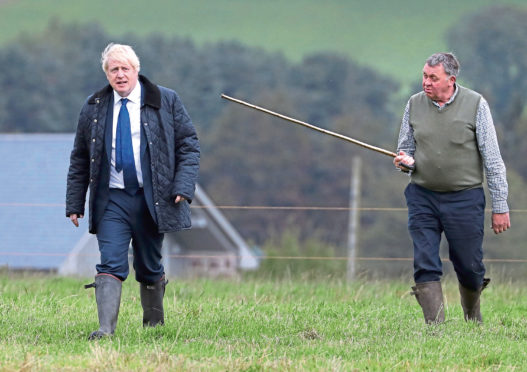A well-known Aberdeenshire farming family welcomed Prime Minister Boris Johnson to its farm yesterday as he announced a £51.4 million boost for the sector.
Mr Johnson visited the Watson family’s Darnford Farm, near Durris, Banchory, during a trip to the north-east.
The funding, which is a recommendation of the Bew Review Group into intra-UK farm subsidy allocations, is in addition to £160m in convergence uplift monies announced on Wednesday.
Convergence uplift is extra Common Agricultural Policy (Cap) funding allocated to the UK to bring Scotland’s per-hectare subsidy average up.
NFU Scotland (NFUS) said the £211m boost was likely to come to Scotland in April next year.
The union’s president, Andrew McCornick, said: “Settling the issue around convergence comes at a time when we are weathering a political storm and many sectors of Scottish farming and crofting are enduring significant price and cost pressure.
“We want our industry to come out the other side of the current turmoil and this huge uplift in funding will help us build greater resilience into our farming and food sectors.”
Rural Economy Secretary, Fergus Ewing, welcomed the latest funding announcement and said: “I expect the UK Government to return this money to Scotland as soon as possible and without any sgrings attached.
“I am clear, that should we receive what has now been recommended, that it is only right and proper, given its origins, that this 60m euros (£51.4m) be ring-fence in Scotland for agriculture.”
Scotland’s representative on the Bew Review Group, Jim Walker – a Dumfries farmer and former NFUS president – said the funding was the outcome of six months of the group taking detailed evidence and opinions from across the UK.
He said: “To get agreement from both my fellow panel members, as well as the UK Government, to the outcome of these detailed and tricky discussions represents a really positive result for Scotland’s livestock farmers in the hills and uplands.
“We now have to ensure these funds are used wisely to try and make a real difference to Scotland’s LFA [Less Favoured Areas] producers.”
He said the money must be used to bring real change and help the industry meet the challenges it will face as it leaves the safety net of the Cap.
